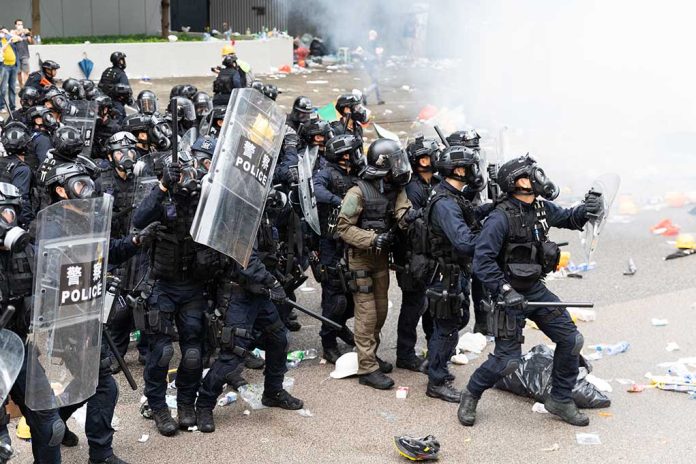
As the 2024 U.S. presidential election approaches, concerns about potential civil unrest are prompting nationwide preparations, with a focus on safeguarding public safety and upholding the integrity of our democratic process.
At a Glance
- Domestic extremists and declining trust in the electoral process pose primary threats to the 2024 U.S. election.
- Over two-thirds of Americans are concerned about potential election-related violence.
- The race between Vice President Kamala Harris and former President Donald Trump is seen as a virtual tie nationally.
- Authorities and businesses are preparing for possible unrest, particularly in urban centers.
- The risk of unrest may increase significantly if the election outcome is tightly contested.
Domestic Threats and Election Security
As the United States comes close to the 2024 presidential election, the primary threats to electoral security are shifting. Unlike previous elections where foreign interference was a major concern, the focus has now turned to domestic extremists and a decline in public trust in the electoral process.
Recent unsolved arson attacks on ballot boxes and increased militia group activities on social media have highlighted the ongoing domestic threats. Despite these challenges, U.S. officials maintain that the electoral process remains secure from foreign interference, even in the face of attempted meddling by countries like China, Iran, and Russia.
"Although an actual civil war resulting from the 2024 election remains highly unlikely, a range of sufficiently alarming scenarios cannot be prudently dismissed or discounted—as the two recent attempts on former President Donald Trump’s life have shown." https://t.co/FjdRFDjGV9
— Jacob Ware (@Jacob_A_Ware) October 31, 2024
Public Concern and Potential for Unrest
The heightened political tensions surrounding the 2024 election have not gone unnoticed by the American public. Surveys indicate a widespread concern about the potential for election-related violence, regardless of which party emerges victorious. This apprehension is not unfounded, as extremist factions on both sides of the political spectrum have shown a willingness to resort to violence.
The Department of Homeland Security has acknowledged a “heightened risk” environment, underlining the seriousness of the situation. Political leaders are attempting to “pre-bunk” potential unrest by addressing concerns proactively, but the effectiveness of these efforts remains to be seen.
Preparing for Potential Unrest
In response to these concerns, both government agencies and businesses are taking steps to prepare for potential civil unrest. Government entities are conducting situational awareness drills and collaborating with law enforcement to manage possible disturbances. Businesses, particularly in urban centers like New York, Los Angeles, Chicago, and Houston, are securing property and developing continuity plans to protect employees and operations.
“The threat is kind of imminent and everywhere,” says Glen Kucera, an executive at Allied Universal.
The risk of unrest is considered particularly high if the election outcome is tightly contested. Some businesses in cities like Portland are taking precautionary measures, such as boarding up windows, in anticipation of potential unrest.
Looking Ahead
As Election Day approaches, the nation remains on edge. With over 77 million people having already voted early, shifts in voting patterns from 2020 are being closely monitored. Early clues about the election’s outcome may come from key states like North Carolina and Georgia, with urban and suburban areas being critical.
While concerns about potential unrest are high, it’s important to note that protections are in place against voter intimidation and other threats. Election officials are prepared to respond to various scenarios, and despite the challenges, many experts maintain that people should feel safe voting.
As the country navigates this period of exceptional political polarization, the focus remains on preventing unrest that could disrupt societal norms and endanger democratic stability. The coming weeks will be crucial in determining whether the United States can peacefully transition through this electoral process or if the fears of civil unrest will materialize into reality.





